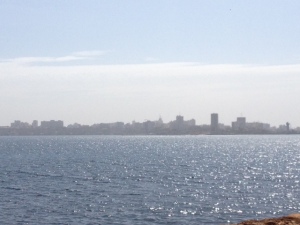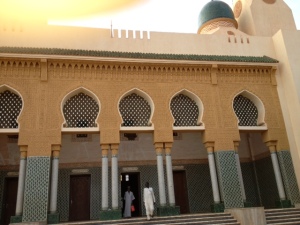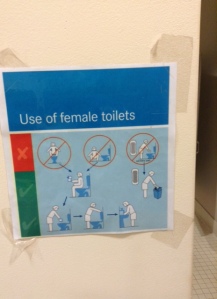“There may have been some *light* terrorism…”
On my About Me page, I alluded to the possibility of writing about my experience traveling in Africa – to add an entertaining counterweight to my more analytical rants and musings on the events unfolding on the continent. The following is about several discussions I recently had while planning for a trip:
People who know me well know that I love me some Arrested Development. In Arrested Development, one of the running jokes is that George Bluth (pictured below) may have committed some ‘light’ treason for illegally building homes in Iraq under Saddam Hussein. This recurring joke is humorous not only because of the way the character says it, but also because light treason doesn’t exist in the American legal system.

Fast forwarding to the present day – In my planning for an upcoming trip, I found myself arguing that the places I was going were reasonably safe because they only had some *light* terrorism. It’s a ridiculous concept because there’s no such thing as ‘light terrorism’, so yes, I do see the flaws in my logic.
Lesley on Africa practices small talk
On my About Me page, I alluded to the possibility of writing about my experience traveling in Africa – to add an entertaining counterweight to my more analytical rants and musings on the events unfolding on the continent. The following is a story about my attempt to bridge the gap between my previous work on conflict and my expanded portfolio, which sometimes includes health:
Guide: South Africa’s health facilities are among the best on the continent. Many people come here for medical treatment.
Lesley: Yes, I understand South Sudanese warlords come here for treatment.
Guide: (Awkward silence)
Lesley: (Makes mental note to draft better small talk points and practice with close friends. Or avoid social interactions altogether.)
“No Escort Required?”
On my About Me page, I alluded to the possibility of writing about my experience traveling in Africa – to add an entertaining counterweight to my more analytical rants and musings on the events unfolding on the continent. The following is a story about an awkward experience I had while trying to get an interview for a project some years ago:
In the District of Columbia, one normally needs an appropriate badge, or even an escort, to access some U.S. government facilities. This is the world with which I am most familiar – and the world that, for better or worse, I project on my experiences entering foreign government facilities.
It is for this reason that I failed to ask for directions when I was doing a drive by of a national security establishment in African Country X in an attempt to make an appointment to interview someone. After showing my passport and explaining to the front desk why I was there, I was directed to walk across the yard to my left and into one of the identical white buildings. I was like, you’re just going to let me wander around your premises? I don’t need a badge or an escort? And the guy was like, that sounds about right.
So wander I did.
I stopped at Ambiguous White Building #1. Looked for signage. Seeing none, I opened the door to what appeared to be a kitchen. I continued to Ambiguous White Building #2. Looked for signage. Seeing none, I opened the door to a non-descript storage area. Frustrated, I wandered around that upper left quadrant of the compound where the front desk guy had told me to go and weighed the merits of returning to him for idiot-proof directions.
Finally, an important looking guy and his entourage spotted me. From that distance, I couldn’t tell what he was saying, but I assumed it was the vernacular equivalent of “What the (insert expletive here) is she doing?!?” The entourage summoned me over and I explained why I was this random American wandering around their national security facility. They directed me to Ambiguous White Building #3, which was not a kitchen or a storage area, but the office of the minister I was stalking attempting to interview.
This, my friends, is how I learned to always ask for an escort to avoid such shady appearances – even if one isn’t required.
Return to the Mothership
Yesterday was my first day back at CNA, the place I’ve affectionately called “The Mothership” for the past fifteen months of my assignment at the Center for Complex Operations. While at CCO, I was working on an analysis of the Trans Sahara Counter Terrorism Partnership (TSCTP), which is an interagency U.S. government program to counter terrorism and violent extremism in the Maghreb and Sahel. I’m hoping my report will be published by the end of February – inshallah.
Working on this project, I learned a lot about the complexity of foreign assistance, and how much more I have yet to learn on the topic. I’m a very hands on learner, so fortunately I had to travel to nine of the ten TSCTP countries. At the time I traveled, I’d accordingly code-named them for security reasons: African Country A (Niger), African Country B (Chad), African Country C (Mali), African Country D (Senegal), African Country E (Morocco), African Country F (Algeria), African Country G (Nigeria), African Country H (Mauritania), and African Country I (Burkina Faso).
Here’s a few pics from my travels & some blurbs about the kinds of things I got myself into when I wasn’t working.

View of the Niger River from my hotel room in Niamey

Niger Police Academy course

View of Dakar skyline from overloaded speedboat. When asked if the boat would make it back to Dakar, the guy driving said “On va essayer!” (We’re going to try!)

Riding a camel was on the bucket list, even though it’s très touristy. But I didn’t like the way this dude was looking at me.

I made my first tajine! It had chicken, peas, and artichokes. It was compellingly mediocre – but my teacher was not to blame.

The real reason my tajine was uninspiring was b/c THERE WERE KITTENS!!! I played with them instead of listening to the instructor.
Lesley on Africa LOVES Fieldwork (or In Praise of Fieldwork)
As the title of this post so emphatically declares, I love when my projects require fieldwork. I’m working on a project in FY13 that has had me traveling to African Country A (Niger), African Country B (Chad), African Country C (Mali), African Country D (Senegal), African Country E (Morocco), African Country F (Algeria) and African Country G (Nigeria). (I’m currently in African Country H and am traveling to African Country I in early September.) And because of my fieldwork, I’m being forced to learn more about these countries and the United States’ relationship with them.
I love doing fieldwork not because I enjoy the unending abuse from Delta/Air France, but rather because I’m a hands-on learner. On this project and the others that preceded it, I’ve found that the assumptions I had before conducting fieldwork were contradicted, or my understanding of how a process did or did not work became more nuanced. I’ve learned, as government-types like to put it, how the sausage is made, and why said sausage sometimes comes out as a cob of corn to the dismay of the people responsible for designing and implementing programs. There is very little that can substitute for this type of learning experience.
Here’s an example of the types of things I’ve learned during my fieldwork in various African countries. Out of necessity, this description is in the abstract and combines the characteristics of multiple countries:
The United States sees the extremist Prophet’s Revolutionary Militia (PRM) as a threat and makes countering the PRM a focus of its programs in the neighboring African countries of Azania and Matobo. However various U.S. government agencies perceive the PRM threat differently and can’t agree on a comprehensive approach. State is concerned about the militarization of U.S. foreign policy, while DoD believes the U.S. isn’t doing enough to counter the threat. Dissenters from both agencies believe the PRM isn’t even the right threat to be countering, and that U.S. programs should have a more comprehensive approach to support state stability. However, Azania and Matobo are marginal to global U.S. strategic interests, and a more comprehensive approach reeks of nation-building à la Iraq & Afghanistan. No thank you.
All U.S. government agencies are on the same page about working with the government of Azania because it has a history of democratic transitions, there’s freedom of the press, and the military has a close, longstanding relationship with the U.S. In Matobo, it’s a different story. The State Department is reluctant to work with the government of Matobo, which is a corrupt, nepotist dictatorship. The Defense Department, however, sees Matobo as a key counterterrorism ally and would like to increase military assistance, but State is concerned about governance, human rights, and upsetting the local balance of power within the country. The difference of U.S. government views on Matobo creates discord between State and DoD, whereas interagency relations with regard to Azania are much smoother.
The U.S. government wants Azania and Matobo to increase regional security cooperation to go after the PRM. Yet, Azania and Matobo are reluctant to work together to counter the PRM because the former believes the latter’s military intelligence leaks like a sieve and there are whispers that people in the Matobolese government have a tacit agreement not to go after the extremist group. In addition, Azania and Matobo have historical animosities due to Azania’s support for the independence movement in the Zangaro region of Matobo. This is why when the U.S. tries to hold multilateral exercises or regional conferences geared towards facilitating regional security cooperation that are held in either country, Azania will invite everyone but Matobo, and vice versa. This refusal to work together persists even though the PRM is increasingly gaining revenue from smuggling along the Azania-Matobo border.
Although limited by State’s resistance to military engagement, DoD conducts minimal training in Matobo. However, they routinely have to change their security cooperation plans if an exercise is planned when the dictator is in Europe receiving medical treatment. This is because no military assets are allowed to move if he is out of the country – this is how he prevents a coup. Engagement is also delayed by requirements to do Leahy vetting for each unit. In a country like Azania that has a long history of military professionalism this is not a problem, but the majority of units in the Matobolese military have been accused of involvement in the country’s three most recent coups, as well as of human rights violations within the disputed territory of Zangaro – even though the Zangaro incidents happened 20 years ago and didn’t involve the current soldiers in the tainted units. On top of this, Matobo is not great at keeping records, so it’s difficult for the U.S. to ascertain who was and was not involved in these violations. And on top of that, there’s a dispute within various elements of the U.S. government as to whether these units were involved in these violations. And on top of that, the dictator recently attempted to change the constitution to stay in power another 5 years, so the military just deposed him and intends to support a transition to democracy in 9 months. Since this is technically an unconstitutional change of government, all U.S. military assistance has been cut off.
The money originally designated for Matobo is reprogrammed to help Azania develop more robust border security, but both the Embassy and the Azanian security forces have a problem with absorptive capacity. Since Azania is a permissive environment for government & NGO programs and has few mechanisms to coordinate and deconflict these programs, funds obligated for Azania are not spent until two fiscal years later. In addition, donor nations eventually discover that they have parallel training programs that are training the Azanians on conflicting doctrine and tactics, techniques, and procedures (TTPs).
The current Azanian president is very receptive to receiving more specialized military training from the U.S. However, the U.S. wants to train Azanian forces to go after the extremist PRM, while the Azanian government sees the PRM as more of a U.S. and European problem. Plus, everyone knows the PRM has a safe haven in Matobo from which they launch attacks into Azania, and the Azanians are annoyed that Matobo isn’t pulling its weight in countering the PRM. To complicate matters, the Azanian force designated for U.S. training is not well resourced by the Azanian government because they only have a Captain in charge of their unit. Other Azanian security forces, which may have overlapping missions and compete for influence, have Brigadier Generals in charge and they have the background and political capital to ensure that their forces are well resourced. For these reasons, the force led by the Captain stays in a training cycle and never becomes an operational force that can operate independent of U.S. assistance. Therefore, specialized training never takes root in Azania.
Oh and guess what. There’s been an election and the new Azanian president was indicted by the ICC for his alleged incitement of violence during a previous election cycle, so security cooperation is now experiencing a “strategic pause.” The Azanians have wisely anticipated that U.S. military assistance has strings attached and they’ve recently diversified their security cooperation relationships. They now receive most of their training from European Country X and Asian Country Y.
Hopefully, this little story gives you a sense of the types of factors I’ve come to understand better once I see them in play 🙂















You must be logged in to post a comment.